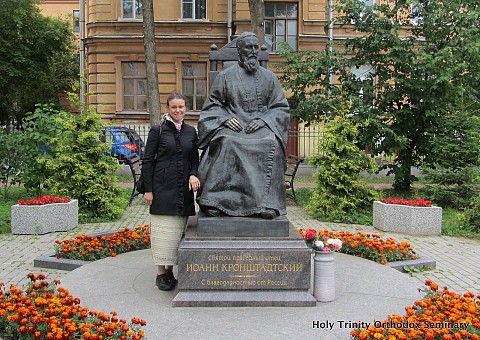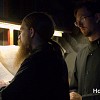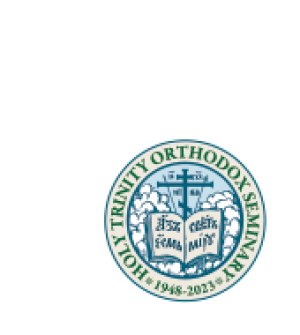Dr. Elena Nelson teaches Russian I, Russian II, Advanced Russian, and Church Slavonic II at Holy Trinity Seminary. Dr. Nelson also teaches Introduction to Church Slavonic for non-Russian speakers at the Holy Trinity Seminary Summer School of Liturgical Music.
This summer I was awarded a Fulbright-Hays fellowship from the U.S. Department of Education to participate in the 2015 American Councils Summer Russian Language Teachers Program. After an orientation in Washington, DC, eleven other Russian teachers and I departed for St. Petersburg, Russia, where we studied in the Department of Philology at the Russian State Pedagogical University (Педагогический университет им. Герцена). We were in class for 140 hours over the course of five weeks, studying methods of language pedagogy and learning about contemporary Russian language and culture. This included studying contemporary mass media and prose, current events, and linguistic topics, including phonetics, new lexicon and borrowings, and topics in grammar. Our group also went on a number of organized cultural excursions in and around St. Petersburg. Near the end of the program, we participated in a weeklong excursion to Moscow, Vladimir, and Suzdal.
The most important part of the program focused on pedagogy. We gathered authentic materials and designed portfolios of teaching materials for use in our institutions. The theme of my portfolio was, of course, the Russian Orthodox Church. I will be integrating these materials into all levels of Russian, with the majority for use in Advanced Russian (Russian 402). What follows is a sampling of topics upon which I designed pedagogical materials.
One topic is St. John of Kronstadt. In June 2015, the Moscow Patriarchate celebrated the 25th anniversary of his glorification. I traveled to various locations and met people connected with St. John and this celebration. I also located original materials and transformed them into Russian lessons. The lessons will be particularly interesting for our seminarians since we live near the world’s first parish dedicated to St. John. This parish is located in Utica, NY, only about 30 miles from our seminary. The Russian Orthodox Church Abroad glorified St. John already in 1964.
Another topic is the Tikhvin icon of the Theotokos. I had the opportunity to travel to Tikhvin Monastery on their 500th anniversary and attended a Patriarchal Liturgy. Pedagogical materials based on the icon, this monastery, and the event may be especially interesting for seminarians because the Tikhvin icon of the Theotokos––one of the most revered in all of Russia––was kept in the United States from 1949-2004.
I also went to Donskoy Monastery in Moscow to venerate the relics of Saint Patriarch Tikhon and to visit the apartment museum where he was incarcerated for two years until his death in 1925. Use of pedagogical materials based on Saint Patriarch Tikhon will be particularly relevant leading up to our academicsymposium, “Saint Tikhon, Patriarch of Moscow (1865-1925): His Life and Times”.
As the Russian and Church Slavonic professor at Holy Trinity Seminary, I was especially eager to make professional contacts in the fields of Russian language pedagogy and Church Slavonic. I met with Russian instructors who have created materials on the theme of the Russian Orthodox Church, and with whom I plan to collaborate in the design of future materials. Furthermore, I met with instructors of Church Slavonic, one of whom surprised me by unexpectedly interviewing me for the national Russian Orthodox television channel Soyuz. I was also invited to take part in online seminars with Church Slavonic instructors from all over Russia.
In addition, I was invited to attend the International Educational Christmas Readings conference (Международные Рождественские образовательные чтения). His Holiness Patriarch Kirill will lead the conference in Moscow, in January 2016. Attending this conference would enable me to make contacts with more Church Slavonic instructors, gain access to their materials, and discuss pedagogical techniques. The conference is dedicated to the theme “Tradition and Innovation: Culture, Society, and Person.” This topic happens to fit perfectly with the topic of my 2010 dissertation, “Tradition and Innovation in Church Slavonic Hymnography,” a large section of which is devoted to the 20th century hymnographer of the Russian Orthodox Church Outside of Russia, Valeria Hoecke. I am presently seeking the funding necessary to attend so that I can further the work that I began this summer. The number of Church Slavonic instructors in the world is extremely limited, especially in the Church Abroad, and in order to provide the best possible instruction and materials to students, it is necessary to make these connections and see what new materials are being published.
This opportunity to travel to Russia was personally important to me, as it was my first time back to Russia since the 2007 reunification of the Russian Orthodox Church Outside of Russia with the Moscow Patriarchate. It was amazing to see how the Moscow Patriarchate is flourishing: every day churches and monasteries are being rebuilt, new churches are being built, and more and more people are becoming monastics. The first time I was in Russia was in 1998, and there were nowhere near the number of churches and monasteries open as there are today.
Finally, one of my favorite moments was finding a monument to the 5th anniversary of the reunification of the Russian Orthodox Church Outside of Russia with the Moscow Patriarchate. The monument, which was erected in 2013, is located on the territory of the Alexander Nevsky Lavra in St. Petersburg. On it is a quotation from Metropolitan Laurus:
Наша задача—вынести правильные уроки из испытаний XX века, чтобы о современной Русской Церкви можно было сказать словами Апостола Иакова: «Блажен муж, иже претерпит искушение: зане искусен быв приимет венец жизни егоже обеща Бог любящим Его.»
Translation: Our task is to learn the right lessons from the trials of the 20th century, so that one could apply the following words of the Apostle James to the contemporary Russian Church, “Blessed is the man that endureth temptation; for when he hath been proved, he shall receive a crown of life, which God hath promised to them that love him.”
|




